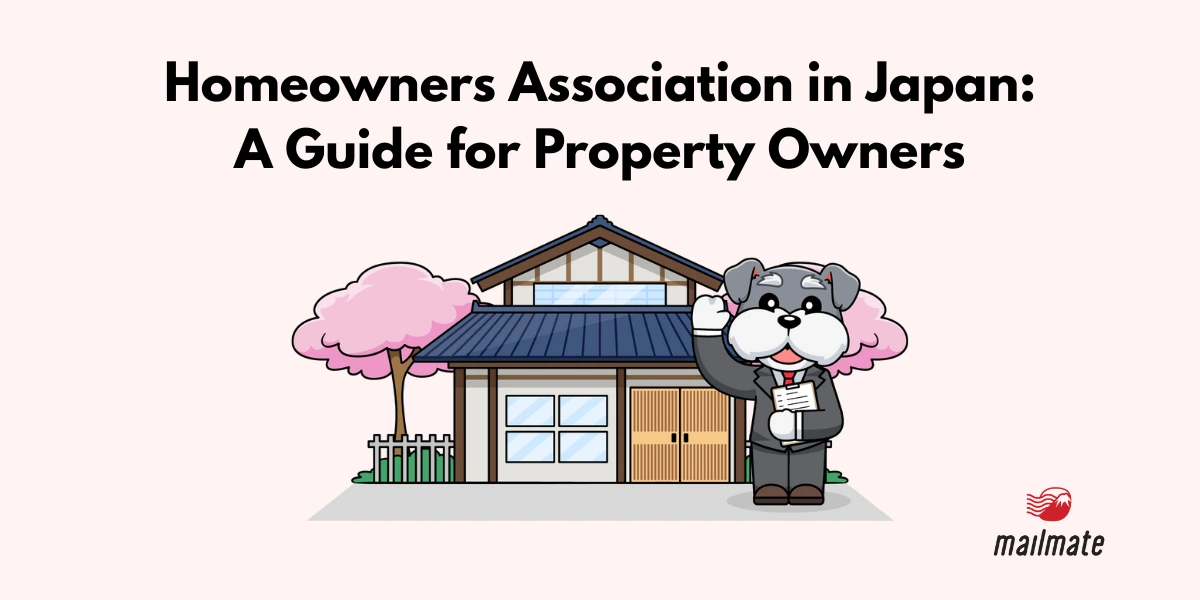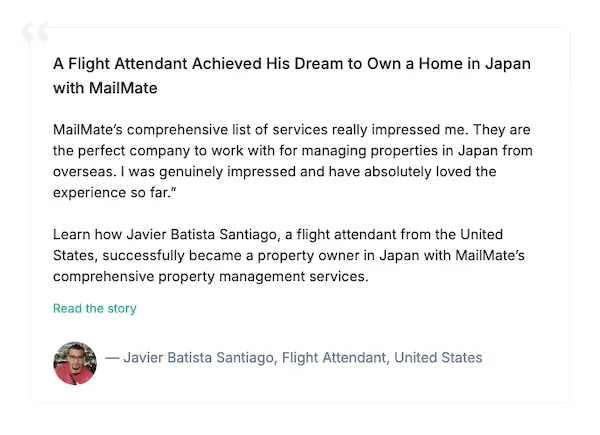Homeowners Association in Japan: A Guide for Property Owners

Japan has become a popular option for property investment due to its diverse opportunities.
If you’ve just bought a condominium or an apartment in Japan, it is important to know what a homeowners association is and what its fees cover.
In this article, we will explain not only the homeowners association fees but also related expenses such as repair reserve funds, insurance premiums, fixed asset tax (固定資産税 Kotei shisan zei), and city planning tax (都市計画税 Toshi keikaku zei).
What is a homeowners association in Japan?
When you buy a condominium or an apartment in Japan, you usually have to become a part of a homeowners association or the building management association (管理組合 Kanri Kumiai). The purpose of this association is to maintain common areas and make decisions about the building together.
According to Japan’s Sectional Ownership Law, unit owners in a condominium complex are expected to manage shared spaces jointly, and the owners need to be part of this association.
Generally speaking, there is no homeowners association for detached houses. However, for those who have purchased an Akiya house, a free house, or bought a property in general, you might want to consider being part of neighborhood associations (自治会 Jichikai), which is not mandatory.
Is there a fee?
For those who own a condominium or an apartment, the homeowners association fees or maintenance fees (管理費 Kanrihi) usually cover the following services:
Cleaning for common areas
Electricity and water bills for common areas
Labor costs for the management staff
Regular inspection
Maintenance costs for elevators and water tanks
Fire and casualty insurance for common areas
Landscaping and shared facility maintenance, etc.
The homeowners association fees sometimes include neighborhood association fees. These are two separate associations: the homeowners associations maintain the building and are legally required, whereas the neighborhood associations are for the comfort and safety of the community and are voluntary.
How much does it cost?
According to the “2018 Comprehensive Survey Results of Condominiums" published by the Ministry of Land, Infrastructure, Transport and Tourism in Japan, the overall average management fee for condominiums is 217 yen per sqm.
The amount of the homeowners association fees or management fees are determined by the size of the apartment. Unless there is a special shared facility such as a roof balcony, the management fee will be the same for rooms of the same size regardless of which floor you live on.
The average amount for a family-type 70 sqm apartment is 15,190 yen per month, and for an 80 sqm it is 17,360 yen per month.
Additional fees to think about
There are other ongoing and one-time fees that property owners should keep in mind.
Repair reserve fund
Condominium and apartment owners need to pay a repair fund for future building repairs. This is used to cover the costs of major repairs that are carried out every 12 to 18 years. The national average is 11,243 yen per month, according to the “2018 Comprehensive Survey Results of Condominiums" published by the Ministry of Land, Infrastructure, Transport, and Tourism in Japan.
However, new and old buildings might charge different fees. Older buildings tend to face higher repair costs.
Disaster insurance premium fee
Fire insurance and earthquake insurance are insurances that cover damage caused by fire or earthquake in the private areas owned by condominium owners. If you also subscribe to personal liability insurance or have a special clause, you can also cover damage to the floors below caused by water leaks caused by the private areas owned by condominium owners.
Fees and taxes upon real estate purchases
When purchasing real estate, including condominiums and apartments, you will also face the following fees:
Agent commission
Registry license tax
Judicial scrivener fees
Settlement money upon closing the sales contract
Remaining payment, etc.
Taxes for owning a property
While owning a property in Japan, there are ongoing tax-related costs on top of all the management and maintenance fees.
Fixed asset tax
The fixed asset tax levied by the Japanese government is one of the major ongoing costs of owning a property, which is levied annually by the local tax office or city office. The fixed asset tax is based on the property price and estimated value of land/building. Whatever your visa status for Japan, or even if you have no visa status, the property owner must pay fixed asset tax.
City planning tax
Additionally, the property owner may have to pay city planning tax depending on the location and zoning of the property. City planning tax is a tax levied by local municipalities that carry out urbanization projects, and not all properties are subjected to city planning tax.
👉Use this property tax calculator to see the general tax estimate for your property!
For any non-resident property owners, consider using a tax representative service like MailMate, which can serve as a liaison between you and the local tax authorities.
MailMate's fluently bilingual tax representative service helps property owners stay up to date on their real estate tax bills by liaising between clients and the local government.

The service includes the following features:
Tax representative for annual real estate tax payments
Domestic point of contact for authorities (required by law)
Bill pay support for property tax payments
Tax notifications with English summaries
A virtual mailbox to receive the mail that arrives at your Japanese property
Manage important property documents and notifications in one place
Other services MailMate offers include utility and Internet setup of your Japanese property!
Frequently asked questions
What is a homeowners association in Japan?
When you buy a condominium or an apartment in Japan, you typically have to become part of a homeowners association (or building management association). This group is responsible for maintaining common areas and making decisions about the building.
Is joining a homeowners association required?
Yes, according to Japan’s Sectional Ownership Law, all unit owners in a condominium complex must participate in the homeowners association to jointly manage shared spaces.
Do detached houses in Japan have homeowners associations?
Generally, detached houses do not have homeowners associations. However, owners may be encouraged to join neighborhood associations (自治会 Jichikai), which are voluntary and focus on community safety and events.
How much is the average condominium management fee in Japan?
The average amount for a family-type 70 sqm apartment is 15,190 yen per month, and for an 80 sqm it is 17,360 yen per month.
What taxes and fees apply when purchasing property in Japan?
Real estate acquisition tax, registry license tax, stamp duty, consumption tax, real estate agent commission, judicial scrivener fees, etc.
What taxes apply yearly when owning property in Japan?
A fixed asset tax is required for all property owners, and a city planning tax is required for property owners whose property is part of the city planning area. Even foreigners without a permanent residence visa are required to pay these taxes if they own a property in Japan.
In closing
Upon owning a condominium or an apartment in Japan, there are different fees the property owners must pay.
Additionally, there are both one-time and ongoing fees and taxes as well.
For your peace of mind, consider appointing MailMate as your tax representative.
Founded in 2019, MailMate has simplified property ownership for foreigners living abroad and is an increasingly popular option recommended by users and well-known industry figures.

Additionally, if you use MailMate's tax representative service for property owners, MailMate will take care of filing the tax representative form with the relevant tax office on your behalf.
Navigate Japan's tax system with an experienced tax representative service tailored for foreign property owners!
Spending too long figuring out your Japanese mail?
Virtual mail + translation services start at 3800 per month. 30-day money-back guarantee.

